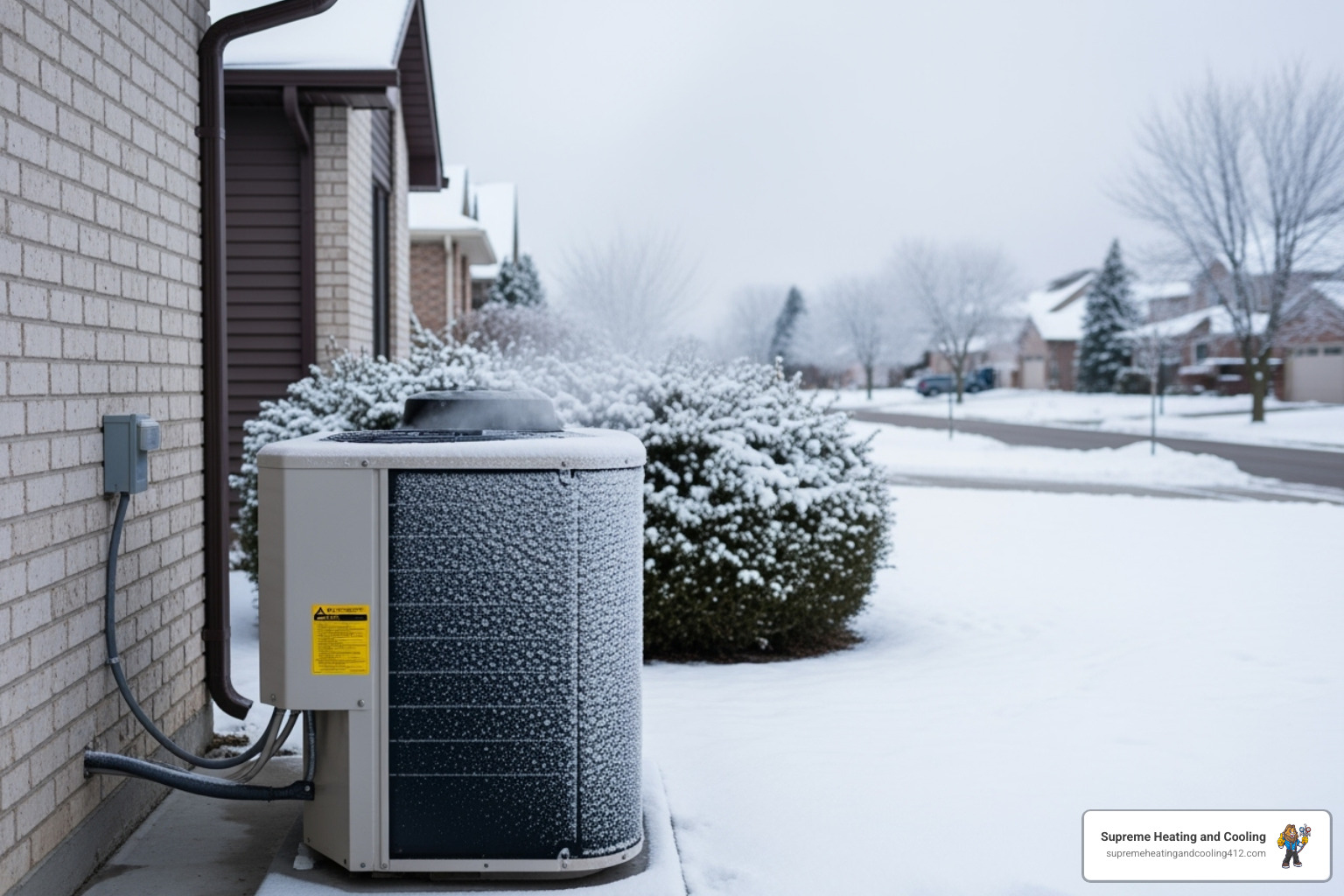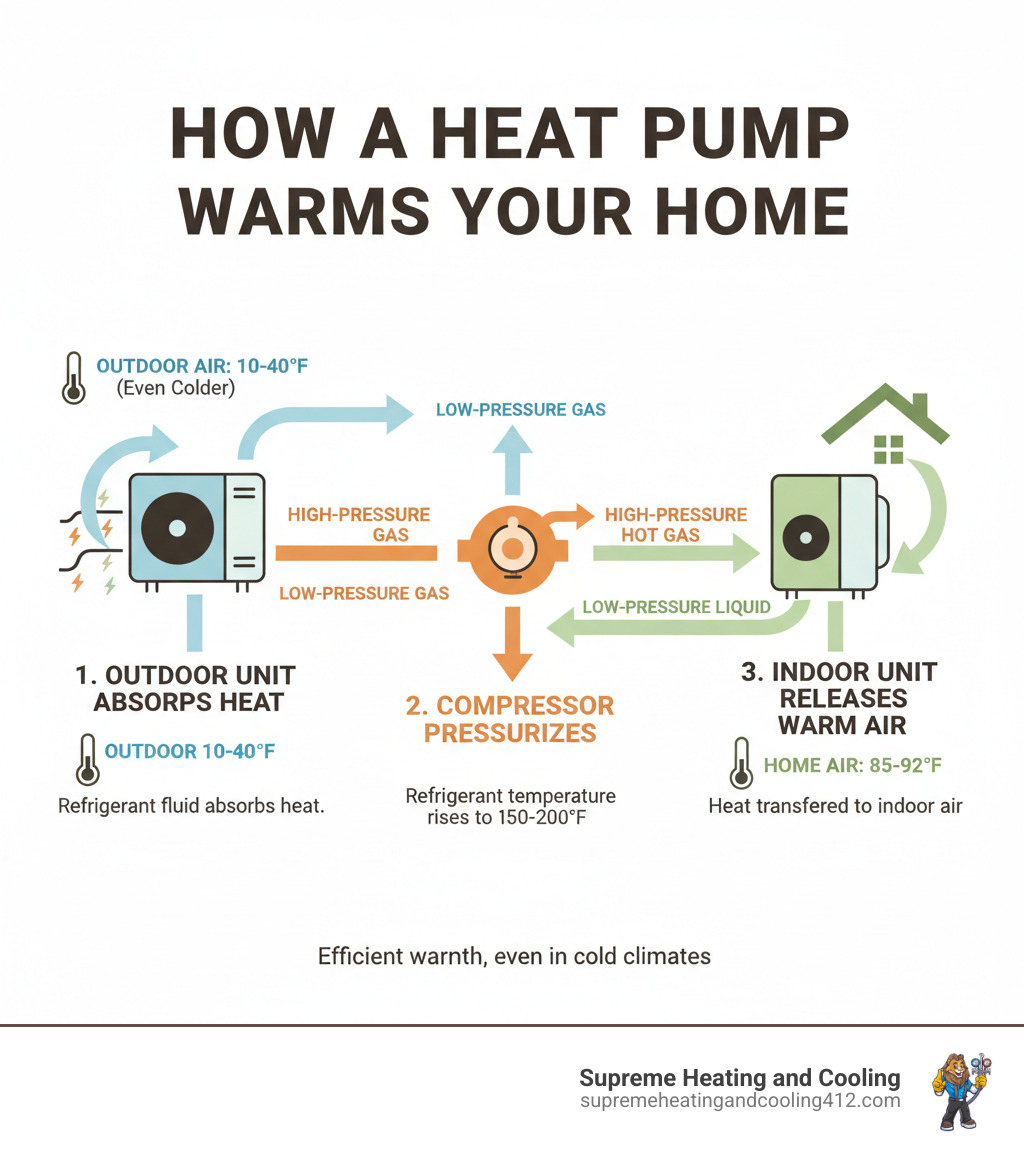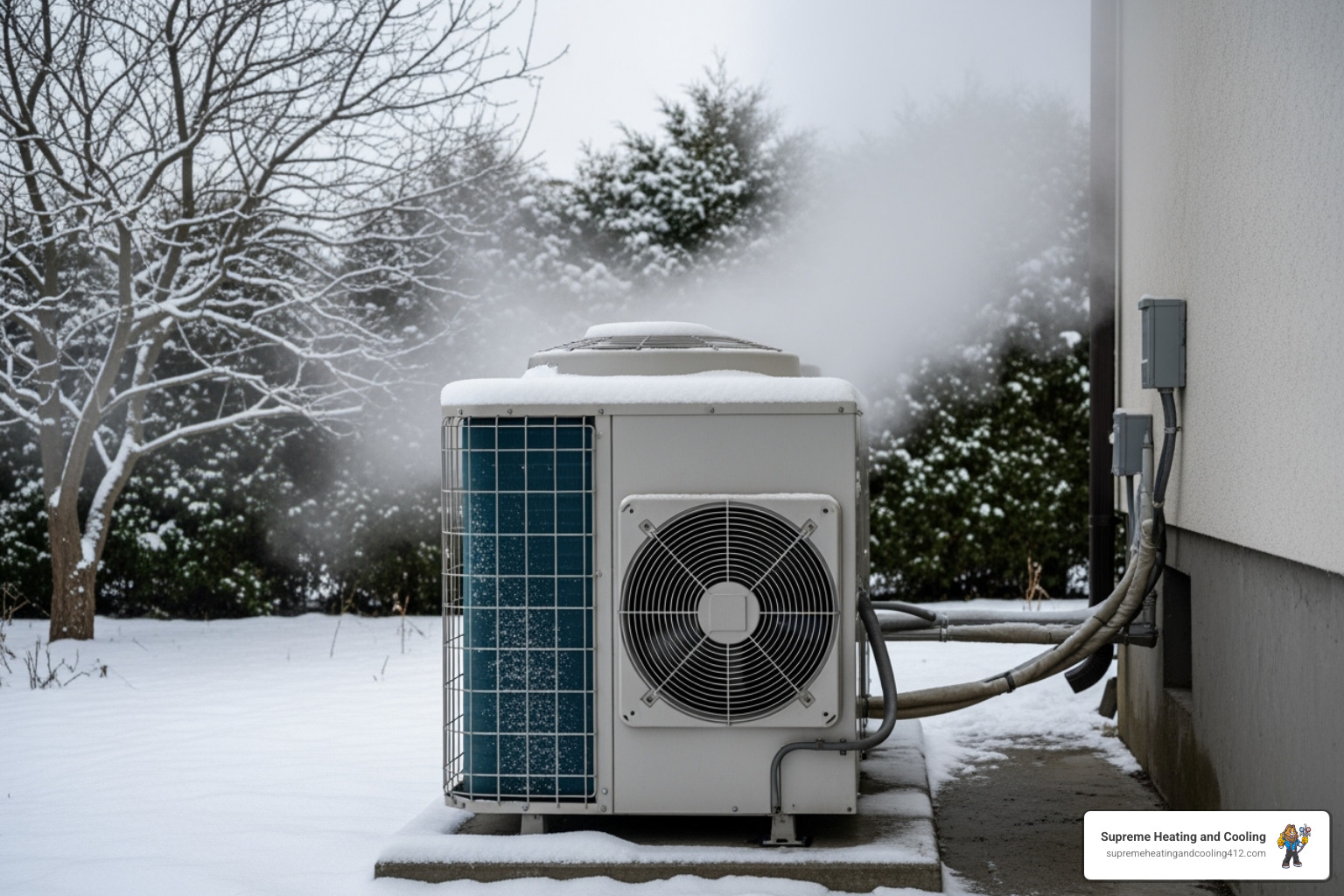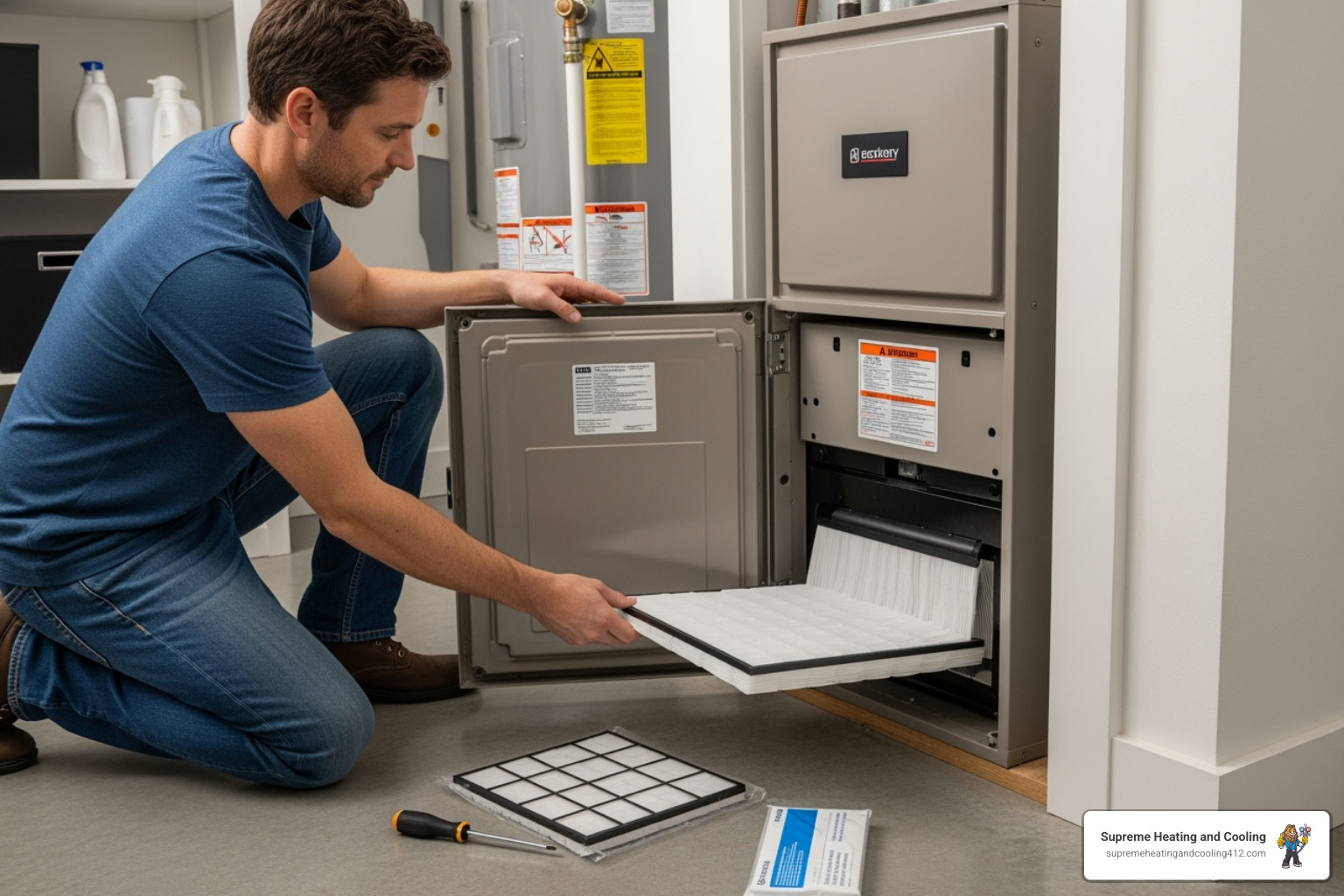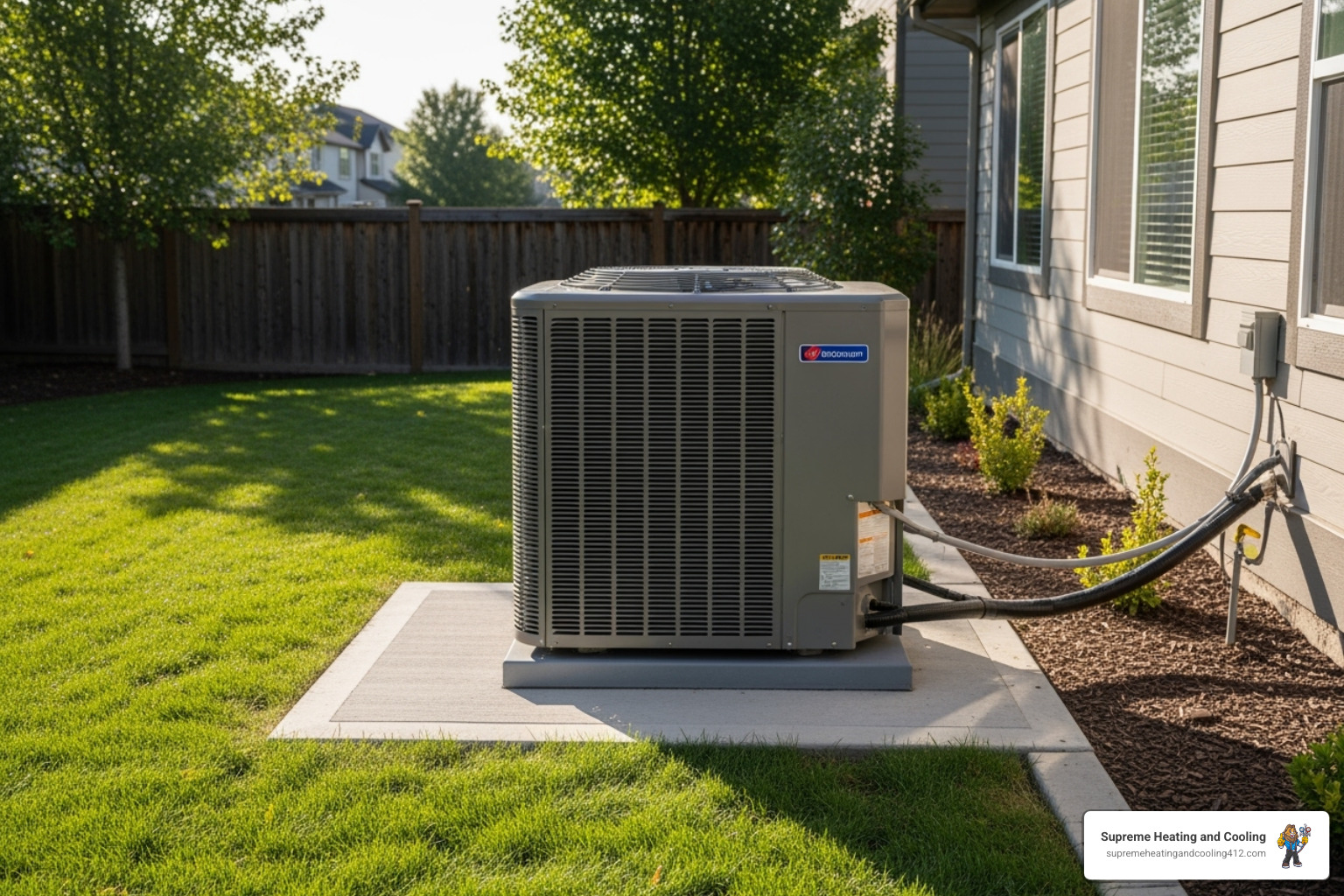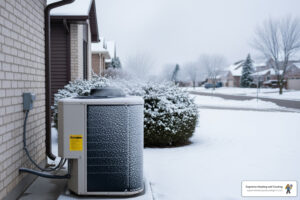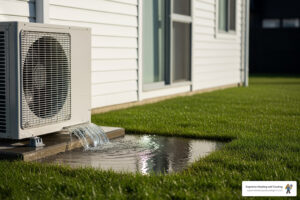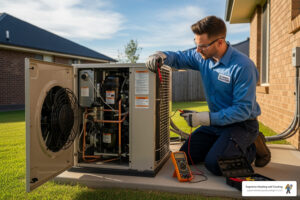Why Your Heat Pump Might Be Blowing Cold Air This Winter
Heat pump blowing cold air in penn hills, pa is a common winter concern. When your heat pump doesn’t deliver the warmth you expect, it’s both uncomfortable and worrying. Sometimes, what feels like cold air is normal, while other times it signals a real problem. Understanding the difference helps you know when to troubleshoot and when to call for professional help.
Quick Answer: Common Causes & Solutions
- Normal defrost mode: Temporary cold air for 10-15 minutes (no action needed).
- Wrong thermostat settings: Set to ‘HEAT’ and fan to ‘AUTO’.
- Clogged air filter: Replace every 2-3 months.
- Blocked outdoor unit: Clear away snow, ice, and debris.
- Low refrigerant: Requires professional leak repair.
- Reversing valve failure: Needs professional diagnosis.
Heat pumps work by extracting heat from outdoor air and transferring it inside. For a quick primer on the technology, see how a heat pump works. The air they produce is typically 85-92 b0F, which can feel cool compared to the 110-140 b b0F blast from a furnace, but is perfectly normal.
If you’re experiencing heating issues in Penn Hills, start with professional HVAC services or schedule a heat pump repair consultation.
Is It Normal? Differentiating Normal Operation from a Real Problem
When you feel cool air from a vent on a cold day, it’s easy to assume something is wrong. But before you worry, let’s determine if your system is malfunctioning or just doing its job.
Many homeowners are surprised that the air from a heat pump naturally feels cooler than air from a furnace. Heat pumps deliver air between 85-92°F. Since this is below your body temperature of 98.6°F, it can feel lukewarm or even cool to the touch, even though it’s effectively heating your home. The real question is when and for how long you feel this cool air.
Understanding Defrost Mode
In Penn Hills, with our cold, damp winters, one perfectly normal reason your heat pump blowing cold air in penn hills, pa is its defrost mode. As your unit pulls heat from the cold air, moisture can freeze on the outdoor coils. To remove this ice, the system temporarily reverses its cycle, sending warm refrigerant to the outdoor unit.
Here’s what you’ll notice during a defrost cycle:
- The outdoor fan stops running.
- Steam or water vapor may rise from the outdoor unit as ice melts.
- The air from your indoor vents will feel cooler for a short time.
This is a normal maintenance function. A typical defrost cycle lasts 10-15 minutes. If you’re getting cold air for 30 minutes or more, or if cycles happen too frequently, it could signal a problem. But if your home is staying at the set temperature, your system is likely working correctly.
How Thermostat Settings Affect Performance
Incorrect thermostat settings are a common cause of “cold air” complaints. A quick check can often solve the problem.
- Mode: Ensure your thermostat is set to ‘HEAT’. If it’s on ‘COOL’ or ‘FAN ONLY,’ it won’t heat your home.
- Fan Setting: The fan should be on ‘AUTO,’ not ‘ON.’ The ‘AUTO’ setting runs the fan only when heating, while ‘ON’ runs it constantly, circulating room-temperature air that feels cool.
- Temperature: Make sure the set temperature is higher than the current room temperature. Avoid making large temperature adjustments at once, as this can trigger less-efficient auxiliary heat.
Simple DIY Checks for Your Penn Hills Heat Pump
Before calling for service for your heat pump blowing cold air in penn hills, pa, a few simple checks can often solve the issue and save you a service call.
Safety first: Always turn off the power to your heat pump at both the thermostat and the circuit breaker before inspecting the unit.
Inspect and Clean or Replace the Air Filter
A clogged air filter is a frequent culprit behind heating problems. It restricts airflow, forcing your system to work harder and reducing efficiency, which can lead to the coils freezing and cold air blowing from your vents.
Check your filter by sliding it out of the indoor air handler and holding it up to a light. If you can’t see light through it, it’s time to replace it (if disposable) or clean it (if reusable). We recommend checking your filter monthly and replacing or cleaning it every two to three months.
Clear Debris from the Outdoor Unit
Your outdoor unit needs clear space to function correctly. Obstructions like leaves, snow, or overgrown shrubs can block airflow and reduce its heating capacity.
After turning off the power, gently remove any leaves, twigs, or snow from the unit. If you see ice that the defrost cycle isn’t clearing, you can pour lukewarm water over it. Never use sharp objects to chip away ice, as this can damage the coils. Maintain at least two feet of clearance around the unit by trimming back bushes and grass.
Check Vents and Registers
Sometimes the problem is as simple as a blocked vent. Walk through your home and ensure all heating vents and registers are open and unobstructed. Furniture, rugs, or curtains can easily block airflow, preventing warm air from circulating and making rooms feel cold. It’s best to keep all vents open, even in unused rooms, to maintain balanced pressure in your ductwork.
Why Your Heat Pump is Blowing Cold Air in Penn Hills, PA: Deeper Mechanical Issues
If you’ve tried the DIY checks and your heat pump blowing cold air in penn hills, pa problem persists, it’s time to consider a deeper mechanical or electrical issue. These problems require the specialized tools and expertise of a trained HVAC technician.
Understanding these potential issues can help you communicate with a technician. Common culprits include refrigerant problems, valve or compressor failures, electrical faults, or simply an aging system.
Refrigerant Leaks and Low Levels
Refrigerant is the substance that transfers heat in your system. If your system has a leak, it won’t have enough refrigerant to heat your home effectively, resulting in cold air from your vents. Refrigerant doesn’t get “used up”; low levels always mean there is a leak.
Signs of a refrigerant leak include:
- Hissing or bubbling sounds from the unit.
- Ice buildup on the coils (indoor or outdoor).
- Oily residue on refrigerant lines.
- The system runs but doesn’t warm your home.
Handling refrigerant requires certification due to federal regulations. Our professional technicians can safely locate and repair leaks, then recharge your system to the correct level.
Malfunctioning Reversing Valve or Compressor
The reversing valve directs the flow of refrigerant to switch between heating and cooling. If it gets stuck in the cooling position, your heat pump will only blow cold air, no matter the thermostat setting.
The compressor is the heart of your system, pressurizing the refrigerant to move heat. A failing compressor can’t circulate refrigerant, rendering the system useless.
Signs of compressor or reversing valve failure include:
- Loud grinding, banging, or rattling noises from the outdoor unit.
- The system turns on but produces no heat at all.
- The circuit breaker trips repeatedly when the system tries to start.
These are serious repairs that require professional diagnosis and service.
Signs of an Improper Installation or Aging System
Sometimes, heating issues stem from long-standing problems. An improperly sized heat pump will either run constantly without reaching temperature (too small) or short-cycle (too large), both leading to poor performance. Leaky or poorly designed ductwork can also lose a significant amount of heated air before it reaches your rooms.
Age is another factor. Most heat pumps last 10 to 15 years. As a system ages, its components degrade, losing efficiency and becoming prone to failure. If your older system struggles to keep up, enters defrost mode too often, or requires frequent repairs, it may be nearing the end of its lifespan.
Repair or Replace? Making the Right Choice for Your Home
When faced with a serious mechanical issue, you have to decide: repair or replace? The right choice for your heat pump blowing cold air in penn hills, pa depends on several factors, including the unit’s age, the cost and frequency of repairs, and its overall efficiency.
Common Signs Your Heat Pump Needs Professional Attention
Your heat pump often gives warning signs before a complete failure. Call for professional service if you notice:
- Climbing Energy Bills: A sudden or steady increase in your utility costs suggests your system is losing efficiency and working harder to heat your home.
- Strange Noises: Grinding, squealing, or banging sounds indicate mechanical problems that need immediate attention to prevent further damage.
- Short Cycling: If the system turns on and off every few minutes, it’s putting excessive wear on components and not heating effectively.
- Inconsistent Heating: Some rooms being warm while others are cold points to a struggling system or ductwork issues.
- Persistent Ice Buildup: If the outdoor unit is constantly covered in ice that doesn’t clear after a defrost cycle, it signals a deeper problem like low refrigerant or a faulty defrost control.
When to Consider Replacing Your Heat Pump
Replacement is a significant investment, but it’s often the smartest long-term choice in certain situations.
- Age: If your heat pump is over 10-15 years old, it’s approaching the end of its expected lifespan. Investing in a major repair for an old unit may not be cost-effective.
- Frequent or Costly Repairs: If you’re constantly calling for service, those repair bills add up. A common rule of thumb is to consider replacement if a repair costs more than half the price of a new unit.
- Outdated Refrigerant: Systems using R-22 refrigerant (Freon) rely on a substance that is being phased out due to environmental regulations. This makes it expensive and difficult to source for repairs.
- Poor Efficiency: Modern heat pumps are far more energy-efficient than older models. A new unit can lower your monthly utility bills, with the savings helping to offset the initial cost over time.
- Inadequate Performance: If your current system simply can’t keep your home comfortable during cold Penn Hills winters, it’s time for an upgrade.
Frequently Asked Questions about Heat Pumps in Penn Hills
Why does the air from my heat pump feel cool even when it’s working?
The air from a heat pump is typically between 85-92°F. Because this is cooler than your body temperature (98.6°F), it can feel cool to the touch, especially when compared to the 110-140°F air from a traditional furnace. As long as your home is reaching and maintaining the temperature set on your thermostat, this is completely normal operation.
How can I tell if my heat pump is in defrost mode?
You can identify defrost mode by a few key signs. At the outdoor unit, the fan will stop spinning, and you may see steam or water vapor rising as ice melts off the coils. Inside, the air from your vents will feel temporarily cooler. Your thermostat may also indicate that auxiliary heat is running. The entire cycle is usually short, lasting only 10-15 minutes.
What are the safety concerns with a malfunctioning heat pump?
While generally safe, a malfunctioning heat pump can pose risks.
- Electrical Issues: Faulty wiring or failing components can create a fire or shock hazard. If your circuit breaker trips repeatedly, it’s a serious warning sign that requires professional inspection.
- Refrigerant Leaks: Refrigerant is a chemical under pressure that should only be handled by certified technicians. Contact with leaking refrigerant can cause skin irritation or frostbite.
- Overheating: Strange burning smells or smoke are signs of overheating components. If you notice this, turn the system off immediately at the breaker and call for service.
If you suspect a serious issue with your heat pump blowing cold air in penn hills, pa, the safest action is to shut the system down and call a professional.
Get Reliable Warmth with Professional Heat Pump Service
We hope this guide helps you understand why your heat pump blowing cold air in penn hills, pa might be happening. While simple DIY checks can often resolve minor issues, it’s just as important to know when to call for professional help.
If you’re dealing with persistent cold air, strange noises, or frequent breakdowns, it’s time to let our team at Supreme Heating and Cooling take a look. Regular professional maintenance is the best way to prevent many of these problems, ensuring your heat pump runs efficiently and lasts longer.
Our philosophy is simple: provide trustworthy, straightforward advice and quality work. We’re here to ensure your Penn Hills home is warm and comfortable all winter, not to sell you something you don’t need.
Don’t spend another night shivering. If you’ve tried the troubleshooting steps without success or want to schedule preventive maintenance, we’re ready to help. Our knowledgeable team understands the demands our local winters place on heating systems.
Get expert HVAC services in Penn Hills, PA and let’s make sure your winter is as cozy as it should be.

